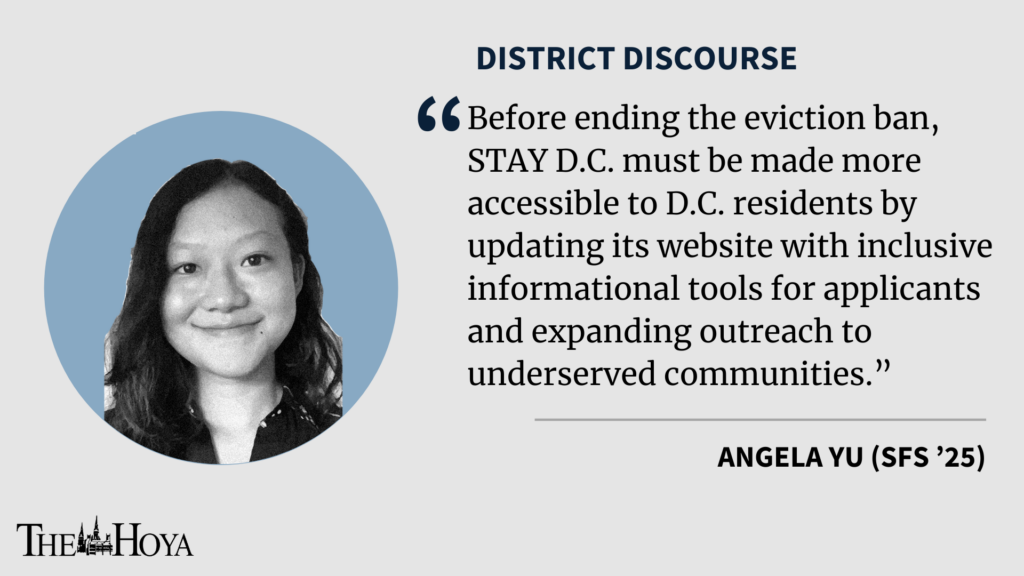As COVID-19 vaccination rates rise in Washington, D.C., a return to normalcy is finally in reach for residents of the nation’s capital. The pervasive effects of the pandemic, however, have permanently altered many residents’ lives. Over the last year, businesses around the city were forced to permanently or temporarily shut down, leaving its workers without a paycheck for the next month’s rent. Washington, D.C. Mayor Muriel Bowser (D) and the D.C. Council responded to demands for renter assistance by instituting an eviction moratorium and, more recently, rolling out a new rent assistance program titled STAY D.C. The eviction ban was set to end on May 31, but the council extended the moratorium and utility shut-offs until September for fear the new program would not be able to handle an influx of requests. Before ending the eviction ban, STAY D.C. must be made more accessible to D.C. residents by updating its website with inclusive informational tools for applicants and expanding outreach to underserved communities.
STAY D.C. was created in April 2021 to replace the COVID-19 Housing Assistance Program as a resource for low-income tenants struggling to afford rent. To qualify, D.C. residents must prove housing instability and make an income below requirements for their household size; for example, a family of four must make below $82,300. Despite its intentions, STAY D.C.’s many technical inefficiencies have resulted in failure to assist renters. Near its launch, residents noticed the translation feature on STAY D.C.’s website was severely lacking: Some languages became unintelligible, and instructional guides only featured screenshots in English. Further, the program’s failure to provide status updates for pending applications left many applicants clueless about the process. Forcing residents facing eviction to rely on an underdeveloped program puts vulnerable families at risk for homelessness.
With the necessary technical improvements, STAY D.C. has the capacity to provide assistance to thousands of tenants. Currently, only around $30 million of STAY D.C.’s $352 million budget have been distributed in rent assistance; roughly $100 million more must be handed out before Sept. 30, or the remaining funds will be returned to the U.S. Department of the Treasury. Members of the D.C. Counci,l including Chairman Phil Mendelson have suggested ending the eviction ban will push renters to request assistance. However, this proposal will not effectively motivate tenants to apply for STAY D.C.’s funds. Many of the program’s barriers to entry are not a result of residents’ lack of willingness to apply but of issues with accessibility. Thus, vulnerable renters should be aided in applying and not punished with a threat of eviction because of STAY D.C.’s failures.
Lifting protections against evictions will inevitably cause overwhelming displacement in Washington D.C.’s most economically disadvantaged neighborhoods. STAY D.C.’s low application numbers show that many low-income families have not received the necessary aid for income lost during the pandemic. By permitting widespread evictions, a wave of residents will be forced onto the streets.
In addition, those most at risk to lose their homes are disproportionately Black and Latinx minority populations. A report from the Harvard Joint Center for Housing Studies found that Black and Latinx households are twice as likely to fall behind on rent and face risk of eviction compared to white households. Lifting the moratorium will undoubtedly deepen the socioeconomic divide between white and Black and Latinx residents. Instead of instituting a decision that will exacerbate housing inequality, the D.C. Council should focus on extending aid to marginalized communities through STAY D.C.
Local lawmakers must prioritize addressing STAY D.C.’s inefficiencies without threatening tenants’ well-being. By implementing more inclusive outreach to demographics facing unstable internet access and language barriers while also maintaining frequent communication with current applicants, the program will be able to fulfill its funding distribution goal before the Sept. 30 deadline.
There are many ways in which D.C residents, including the Georgetown University community, can play a role in alleviating the rent crisis. Tenant advocacy programs such as the Latino Economic Development Center and Housing Counseling Services provide free counseling for those seeking financial advice. Assisting low-income tenants in signing up for housing aid through these local programs is an impactful way to become involved in a pressing local issue. But regardless of efforts by the community to address the crisis, the D.C. Council must acknowledge the horrific consequences of eviction by accelerating funding distributions before ending the eviction moratorium.
Angela Yu is a first-year in the School of Foreign Service. District Discourse appears online every other week.









